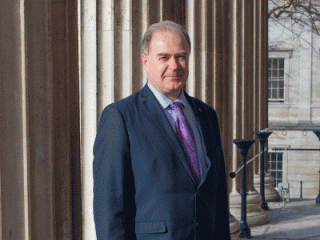Professor Ivan Parkin, Dean of the Faculty of Mathematical and Physical Sciences, provides an update on the faculty response to the ongoing Covid-19 pandemic.

Keeping continuity and routine at this time is important. Firstly making sure you all follow government advice will help keep all of us safe and slow onward transmission. Please encourage others to fully comply with the self-isolation, distancing and hand washing guidelines.
For students
For our students, staff are doing a great job through the personal mentoring system in knowing where they are and supporting them. Online teaching is continuing and we are getting to grips with using distance technology from tablets to blackboard. We are developing new assessment processes to replace some exams and where exams do take place adjusting them to an open book and 24 hour exam period.
For our PGT students we are amending projects where necessary so as to not penalise them and coming up with innovative ways of changing projects so that the student can do meaningful research. This is particularly challenging in synthetic areas but through a combination of amended projects, analysis of data sets and computational/ theory work staff are doing their very best to give students a substantive project.
For PGR students we are pressing for clarity with funders and enquiring about extensions.
Research and Community
In research for quite a number of groups in the faculty it is possible to work remotely at near the same pace as before, especially in parts of maths, stats, physics, chemistry, earth sciences and historical research. For many being separated from their labs is a significant challenge. However, groups are adapting - staff are using this time to analyse data, write proposals and complete publications.
Group chats, huddles, coffee mornings and pictures of plants and animals from home have sprung up. Seminars are taking place via Zoom and Teams platforms. For many of us this crash course in online meetings and interactions has shown how powerful the technology is and may change for most of us our ways of working in the future.
Infrastructure
All of the MAPS buildings are now officially closed. There are security sweeps of the buildings to check for water leaks etc. and there are a couple of small pockets of research continuing where the work is directly focused on COVID research (more below). Departments have identified a few key staff – particularly around IT who are maintaining some limited access to fix tripped or broken servers or to refill liquid nitrogen. It is not possible for anyone else to get access at this time.
How we are helping nationally and internationally with COVID research
I am exceptionally proud of the way staff and students have adapted to this crisis. In particular we have adapted a lot of our research to understanding and tackling COVID.
Christina Pagel (Maths) and her team with colleagues in Engineering led by Rebecca Shipley are helping analyse ICU time series data from Covid-19 patient vital signs to help understand the course of disease better in critically ill patients and help the clinical teams caring for these patients.
Sarah Edwards (STS) is advising London hospitals on resource allocation, and on repurposing drugs.
Peter Coveney (Chemistry) is leading a substantial effort from the European Computational Biomedicine Centre of Excellence to address the Covid-19 pandemic. He is working with DOE laboratories (in particular, Argonne National Laboratory, leading the US effort, and Brookhaven National Laboratory) along with Rutgers University, Leibniz Supercomputing Centre (LRZ) in Munich, and NSF, in an effort to determine suitable compounds that could act as inhibitors of the Covid-19 virus.
Beppe Battaglia (Chemistry) is working on two strands - Antiviral therapy: Reformulating existing antiviral drugs using their phenotypic targeting strategies to deliver them to infected cells. This will ensure intracellular delivery and potential competing with virus entry and - Anti-inflammatory on targeting activated macrophages to stop inflammation.
Rachel McKendry (LCN) has a team working on developing rapid diagnosis testing.
Stefan Howorka (Chemistry) has a team looking at new nanopore technology as a sensing platform.
On a practical level, The WEISS team in Engineering that includes many from the faculty are helping with new ventilator design.
Andrea Sella and colleagues from Chemistry are using a WHO recipe to make alcohol based handgel for use at UCLH, as well as supply the hospital with the chemistry department's stock of protective gloves.
Looking forward
We don’t know when this crisis will end and we are examining various scenarios going forward. In particular looking to improve our online teaching provisions as these maybe needed again in an enhanced form at the start of the new academic year.
Keep strong
These are exceptionally challenging times, a war against an unseen enemy. Our faculty is changing and adapting to a new way of working supporting our communities and people. Many thanks to all of you for your hard work, dedication and skill in adapting to this immense challenge. The UCL website is the key source of information about Covid related issues at all levels.
https://www.ucl.ac.uk/news/2020/mar/advice-staff-and-students-who-may-have-concerns-about-outbreak-coronavirus
I will keep you informed with regular updates as I get them. Keep safe and thank you.
Ivan
 Close
Close

